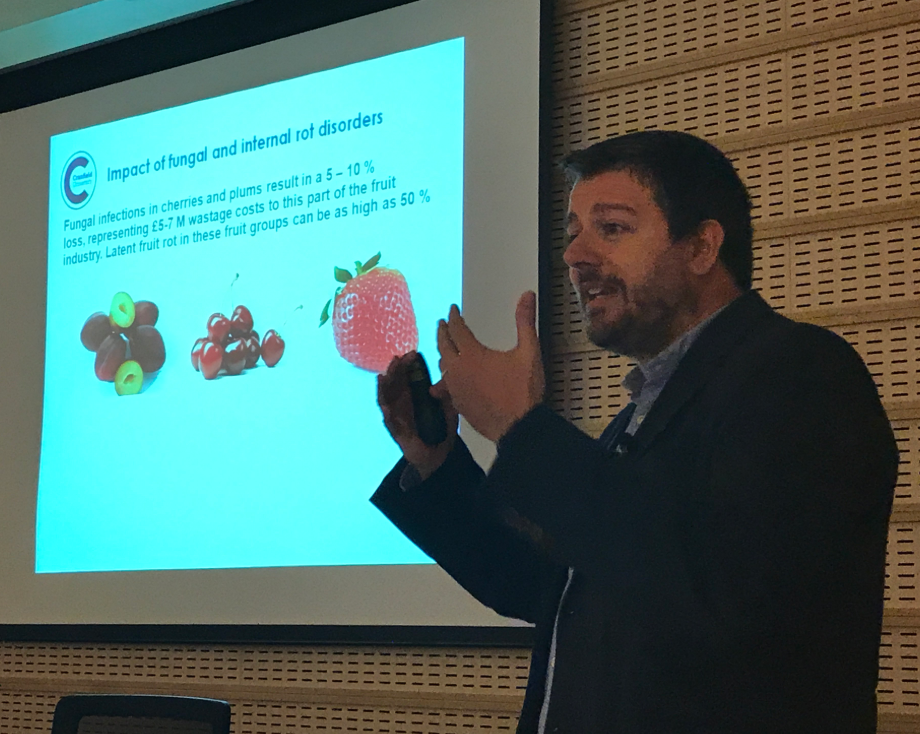Early detection of fungal pathogens in fruits
23/09/2019

Recently Dr Angel Medina presented at the Postharvest workshop organised by (IRTA). He shared his research on early detection of fungal pathogens in fruits and vegetables using volatile organic compound (VOC) biomarkers.
Volatile organic compounds are compounds that easily become vapours or gases and can be sampled through breath or diet and are used to detect fungal pathogens. VOC biomarkers provide a non-invasive and quick approach to detect fungal pathogens.
Examples of where VOCs have been used for early identification of fungal and bacterial rots is in the spoilage of fruits and vegetables. Fungal infections in cherries and plums result in a 5-10% loss representing a cost of £5-7 million in wastage in this section of the fruit industry. Detection of disorders post storage and prior to market would enable infected fruit to be safely marketed early to reduce loss. There are many advantages to identifying biomarkers such as the detection of disorders post-harvest which would enable infected produce to be isolated resulting in a reduction in the spread of infection and thusly enabling better crop management.
The results indicate that the prototype validation for strawberries show the amount of biomarkers detected or emitted depend on a number of parameters such as the fruit origin, variety, size as well as punnet size and temperature. The data analysis of this is very challenging due to the number of parameters that affect the result.
The current progress in the research project is that there is a detection system which has been built to monitor latent fungal infection emitted by strawberries. The system built is fit for purpose in terms of sensitivity, speed and ease of use. It is to be further investigated as to whether other fruits and vegetables may be able to give more reliable information as analysing the data from strawberries has been challenging.
Categories & Tags:
Leave a comment on this post:
You might also like…
Keren Tuv: My Cranfield experience studying Renewable Energy
Hello, my name is Keren, I am from London, UK, and I am studying Renewable Energy MSc. My journey to discovering Cranfield University began when I first decided to return to academia to pursue ...
3D Metal Manufacturing in space: A look into the future
David Rico Sierra, Research Fellow in Additive Manufacturing, was recently involved in an exciting project to manufacture parts using 3D printers in space. Here he reflects on his time working with Airbus in Toulouse… ...
A Legacy of Courage: From India to Britain, Three Generations Find Their Home
My story begins with my grandfather, who plucked up the courage to travel aboard at the age of 22 and start a new life in the UK. I don’t think he would have thought that ...
Cranfield to JLR: mastering mechatronics for a dream career
My name is Jerin Tom, and in 2023 I graduated from Cranfield with an MSc in Automotive Mechatronics. Originally from India, I've always been fascinated by the world of automobiles. Why Cranfield and the ...
Bringing the vision of advanced air mobility closer to reality
Experts at Cranfield University led by Professor Antonios Tsourdos, Head of the Autonomous and Cyber-Physical Systems Centre, are part of the Air Mobility Ecosystem Consortium (AMEC), which aims to demonstrate the commercial and operational ...
Using grey literature in your research: A short guide
As you research and write your thesis, you might come across, or be looking for, ‘grey literature’. This is quite simply material that is either unpublished, or published but not in a commercial form. Types ...






